Wacky Problems You Should Expect With Raising Backyard Chickens
Chickens are generally healthy, hardy, and happy animals that also can be very friendly to people and each other (and other animals).
When raising backyard chickens there are a few things to think about.
But, unfortunately, one reality about raising chickens is simply that chickens are very prone to sickness, disease, and behavioural issues.
It never seems to matter how careful chicken keepers are – problems with health and behaviour always seem to arise even with the best of care and the most careful attendance paid to them.
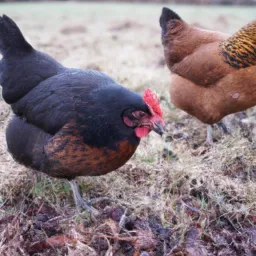
Basically, the truth is, that problems do arise with raising chickens.
Most problems with chickens are very common and are generally fairly easy to deal with.
Some require minimal adjustments to solve.
Some common issues, no matter how careful you are, require an immediate and severe response so as to not lose the entire flock.
Here are the most common problems that you can expect with chickens, and how you can fix them.
Predation And Raising Backyard Chickens
This is one very common and heartbreaking problem that every chicken keeper will probably have to deal with at least once in their lifetime.

It seems like everything wants to eat chickens – from the common hawks and eagles that fly in the sky, to the neighbor’s dog.
Raccoons, foxes, bobcats, bears, snakes, cats, owls, and many other animals are common problems.
So, securing your chicken coop properly or purchasing well-made chicken coop kits can help discourage predators from taking chickens while they’re in the coop (which is very common).
While the chickens are out of the coop, having secure chicken runs that are covered will help discourage aerial predators and daytime predation.
If you insist on free-ranging your flock outside the confines of a fenced chicken run.
Provide lots of tree cover to quell hawk and eagle attacks, and purchase chicken breeds that do well free-ranging and are very predator-savvy.
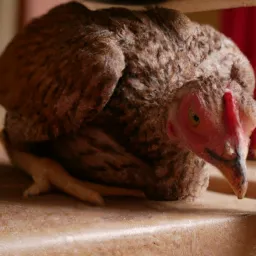
More like the lighter breeds as they can run faster and are quite agile.
Disease
Chickens are no exception when it comes to being susceptible to viral, bacterial, parasitic, and congenital sickness like any other animal out there.
There are vaccines that are available to immunize your birds against common yet deadly sicknesses such as Mericks’s Disease.
You should check with your local extension agent or veterinarian about whether these diseases are prevalent in your area before you buy chicks, or if you have birds that are healthy but haven’t been vaccinated.
Other sicknesses, such as simple viral infections, can manifest themselves in chickens in many ways and are usually best separated from the rest of the flock, as you would in a person, in isolation.
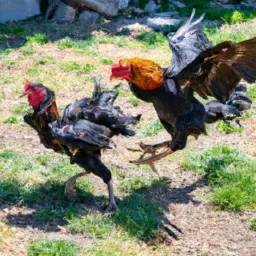
Practice the best sanitary care that you can, and don’t be afraid to use products such as diatomaceous earth or poultry dust.
There are medications available for farm use that you can find at feed stores but always check with a vet first before you medicate.
Have a quarantine system ready to go at all times, clean and prepared.
A dog kennel lined with old but clean towels is a good start. Any sick chicken should be isolated from the flock remember.
Chicken Aggression
Roosters are the usual culprit when it comes to aggression, but don’t rule out the hens as well…
You can get a bully in raising backyard chickens, but infighting is usually when one hen will not back down, you have a fight on your hands, and it can sometimes usually get nasty if the two hens will not concede.
The fight will go on till one does turn tail and run the other way.
But sometimes hens can also be aggressive towards people and other chickens in the flock.
See also Introducing New Chickens to the Flock
Not that I have found this myself.
Aggressive hens can be very problematic if they attack people and other hens.
These hens can do more harm than good within the flock and are often hard to rehome and may need to be euthanized.
Thankfully aggressive hens are rare.
Multiple roosters in a small flock with hens will almost guarantee rooster aggression towards each other, towards hens (with aggressive, forceful mating behavior), and towards people.
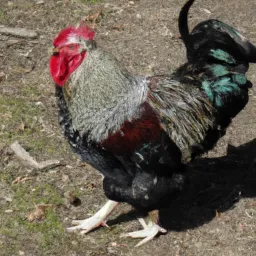
So study your roosters when you first get them to see if they are a good egg or a bad egg.
If you’d like a rooster, keep one single rooster for every 6-10 hens to help quell aggressive forced mating behavior and lessen his need for competition.
When raising backyard chickens, a bigger space is a very good idea, so they have room to get away from each other, don’t get more than one rooster if you have a small space.
Or you can do what I have done.
Make a small coop keep them in and swap them over with the hens every now and again.
If raising backyard chickens includes a rooster that is attacking people, generally this is an issue that can’t be solved through training or the addition of hens to breed with and protect.
Human-aggressive roosters should either be rehomed or in extreme cases euthanized.
I have found if you breed with an aggressive rooster, his progeny is going to be the same, so only breed with a rooster with a kind disposition.
Sometimes people report being able to retrain an aggressive rooster by capturing and holding him, which can work.
Do try this first, but not all roosters and going to be tamed.
And of course, not all roosters are aggressive towards people.
Far from it.
Behavioural Issues
Raising backyard chickens does have its trials as with any animal, hey! Why not even say, some people are the same…
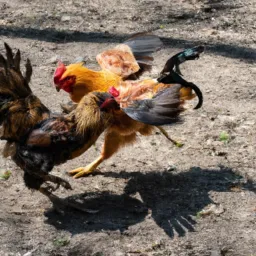
It’s a fact of life…
Sometimes it isn’t necessarily aggression-related.
Chickens can be neurotic.
Yes!
It’s true…
- They do things like cannibalize each other out of simple boredom.
- They will lay eggs, then turn around and eat the eggs they just laid.
- They will eat things like paper clips and screws and pieces of plastic.
- Their pecking order may isolate a chicken and prevent her from eating.
To avoid these sorts of behavioral issues, make sure your chickens are fully engaged at all times.
This doesn’t mean you have to put on a 3 ring circus for your birds, but they do need to have enough space to move and explore as they do normally.
No animal wants to be bored day after day with nothing to stimulate their minds.
They need to be able to dust bathe scratch at the ground, and explore under logs and stones.
They need to be able to jump on things.
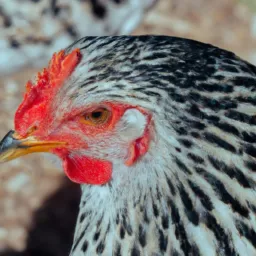
They need a varied diet of more than their formulated crumble (but the scientifically formulated crumble is excellent for basic nutrition and will help prevent the cravings for eggs and random garbage).
Offer simple and fun treats like a head of lettuce, a halved watermelon, or even a cooked winter squash.
Suet cakes make great treats in the winter.
Offer lots of natural perches and rocks for them in their closed run, or risk-free ranging.
The Eggs-traordinary Tales: Backyard Chicken Egg Problems Unveiled
Calling all backyard chicken enthusiasts!
Get ready to crack open the egg-citing world of clucky conundrums!
The Miniature Marvels: Tiny Eggs
When it comes to backyard eggs, size does matter.
But what happens when your hens start laying eggs that can fit in the palm of your hand?
Fear not, it’s not a case of your chickens moonlighting as quail.
See also The Most Common Chicken Breeds: Which One Is Right for You
Tiny eggs are a common occurrence, especially when hens first start laying. It’s their way of getting their egg-laying machinery up and running.
So, enjoy these miniature marvels while they last, and soon enough, your hens will be laying regular-sized eggs.
The Double Yolk Dilemma
Imagine the excitement of cracking open an egg, only to discover not one, but two bright yellow yolks staring back at you.

Double yolks are like winning the egg lottery, but what causes this eggs-tra special phenomenon? It’s often seen in young hens who are just starting to lay eggs. As they mature, their bodies adjust, and single yolks become the norm.
So, savor the double yolks while they last, and relish in the extra-rich egg experience!
Shell Surprises: Soft and Oddly Shaped Eggs
Sometimes, your hens might surprise you with an egg that lacks a sturdy shell.
Soft-shelled or shell-less eggs are not uncommon, and they can leave you scratching your head. But fear not, it’s usually a temporary glitch in the egg-laying process.
It can happen when hens are stressed, experiencing dietary imbalances, or simply adjusting to their egg-laying routine.
So, if you find a shell-less egg, don’t shell out the worry just yet. Give your feathered friends some extra love and a well-balanced diet, and they’ll be back to laying picture-perfect eggs in no time.
The Vanishing Act: Hidden Nests
Picture this: you go about your usual egg-collecting routine, only to find mysteriously missing eggs. It’s like a magic trick, but not the kind you wanted.
Hidden nests are a sneaky phenomenon that can leave you searching high and low for the elusive egg stash. Hens can be expert nest finders, opting for secret spots away from the coop.
So, keep your detective skills sharp and follow the clues – look for signs of disturbed vegetation or unusual chicken behavior. With a bit of persistence, you’ll uncover their secret hideout and reclaim your missing eggs.
The Broody Blues
Broody hens are like the divas of the chicken world.
They decide they want to be mothers and dedicate themselves to sitting on eggs, whether they’re fertile or not. It’s their way of nurturing their inner motherly instincts.
While it may seem adorable, it can be a bit of a problem if you’re hoping for an uninterrupted supply of eggs. Broody hens will stop laying during their brooding phase, leaving you with empty nest boxes.
So, grab a cup of tea, have a heart-to-heart chat with your broody hen, and convince her that being an auntie is just as fulfilling.
As we wrap up our eggs-traordinary journey through backyard chicken egg problems, it’s clear that being a chicken owner is a delightful mix of surprises and laughter.
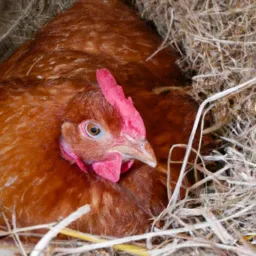
From tiny eggs and double yolks to soft shells and hidden nests, each egg holds its own story, adding a touch of excitement to your daily egg-collecting adventures.
So, embrace the quirks, enjoy the surprises, and remember that even with a few hiccups, your backyard chickens are cluck-tastic companions that provide endless entertainment and delicious eggs.
Raising backyard chickens can be a wonderful addition to the home garden and are essential on the homestead.
They offer immense enjoyment and seem to simply “fit in” with our human lifestyle.
They’re fun, cute, beautiful, and smart.
They offer a lot more in return for what they’re given.
Despite the problems that chicken owners will have to face, they’re so very much worth it!
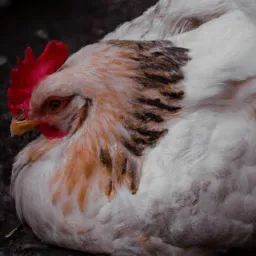
Yes…
When it comes to raising backyard chickens, don’t be put off by the things that can go wrong.
Think of the many benefits that they will give and the void that they can fill in your life that you didn’t even know.
